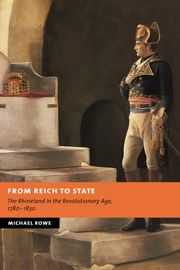Book contents
- Frontmatter
- Contents
- Preface
- Maps
- 1 Introduction
- PART I 1780–1801: ENLIGHTENMENT, REVOLUTION, OCCUPATION
- PART II 1801–1813: NAPOLEON
- 4 The Napoleonic method of government
- 5 Identities and state formation
- 6 War and society
- 7 The Rhineland and the Continental System
- PART III 1813–1830: TRANSITION, REFORM, REACTION
- Bibliography
- Index
- NEW STUDIES IN EUROPEAN HISTORY
5 - Identities and state formation
Published online by Cambridge University Press: 05 September 2009
- Frontmatter
- Contents
- Preface
- Maps
- 1 Introduction
- PART I 1780–1801: ENLIGHTENMENT, REVOLUTION, OCCUPATION
- PART II 1801–1813: NAPOLEON
- 4 The Napoleonic method of government
- 5 Identities and state formation
- 6 War and society
- 7 The Rhineland and the Continental System
- PART III 1813–1830: TRANSITION, REFORM, REACTION
- Bibliography
- Index
- NEW STUDIES IN EUROPEAN HISTORY
Summary
At Cologne they speak simply a coarse vulgar German, which degenerates in approaching the flats of Holland: but at A[a]chen, bad German, bad French, some Dutch and Flemish (bad or good I know not) and a mixture of the Walloon dialect, of which you hear more at Liège, conspire to form a Babel of harmonious diversity.
An objection [against the reunion of the Rhenish departments with France] … is that a mixture of many peoples of differing language and character can destroy harmony, public opinion, internal peace.
Few sights more disconcerting could have confronted a rationally minded Napoleonic bureaucrat than the heterogeneous Rhineland. He viewed cultural diversity ‘not [as] the characteristic of the rational individual, but [as] evidence of the historical survival among groups and communities of beliefs and superstitions that belonged to earlier ages’. It was not only that a Rhenish department like the Roër encompassed under the Old Regime thirty-two territorial entities. Territorial fragmentation was matched by confessional diversity and a plethora of local patois, or ‘local dialects and ways of speech’, as Braudel more accurately refers to them.
Contemporaries experienced difficulty placing Rhinelanders within any single, culturally defined category. Dorsch, the former radical who became sub-prefect of Cleves, distinguished between Rhinelanders of Dutch origin, who spoke ‘German gibberish’, and ‘Prussians’. Many Germans from the right bank believed Rhinelanders closer to the Dutch in character.
- Type
- Chapter
- Information
- From Reich to StateThe Rhineland in the Revolutionary Age, 1780–1830, pp. 116 - 157Publisher: Cambridge University PressPrint publication year: 2003



